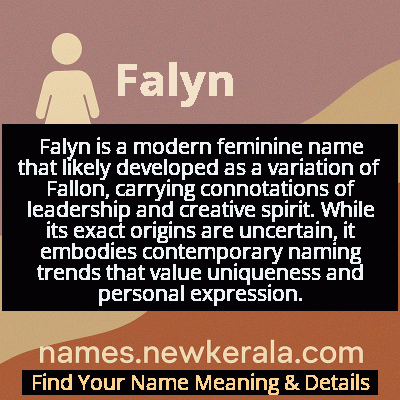Falyn Name Meaning & Details
Origin, Popularity, Numerology Analysis & Name Meaning of Falyn
Discover the origin, meaning, and cultural significance of the name FALYN. Delve into its historical roots and explore the lasting impact it has had on communities and traditions.
Name
Falyn
Gender
Female
Origin
Unknown
Lucky Number
4
Meaning of the Name - Falyn
Falyn is a modern feminine name that likely developed as a variation of Fallon, carrying connotations of leadership and creative spirit. While its exact origins are uncertain, it embodies contemporary naming trends that value uniqueness and personal expression.
Falyn - Complete Numerology Analysis
Your Numerology Number
Based on Pythagorean Numerology System
Ruling Planet
Uranus (Rahu)
Positive Nature
Strong sense of order, loyal, practical, and disciplined.
Negative Traits
Stubborn, overly serious, rigid, and prone to feeling restricted.
Lucky Colours
Blue, gray.
Lucky Days
Saturday.
Lucky Stones
Blue sapphire.
Harmony Numbers
1, 7, 8.
Best Suited Professions
Managers, engineers, accountants, organizers.
What People Like About You
Dependability, discipline, practicality.
Famous People Named Falyn
Falyn Fonoimoana
Professional Volleyball Player
Competed in international beach volleyball tournaments and AVP professional circuit
Falyn Reed
Musician/Composer
Released multiple independent albums blending folk and electronic music genres
Falyn Meyer
Digital Content Creator
Built substantial online following through creative lifestyle and fashion content
Name Variations & International Equivalents
Click on blue names to explore their detailed meanings. Gray names with will be available soon.
Cultural & Historical Significance
The name's cultural significance lies in its embodiment of modern American naming trends—balancing uniqueness with familiarity, honoring heritage while embracing innovation. It particularly resonates with families of Irish descent seeking to maintain cultural connections through adapted naming practices. Falyn's emergence and sustained usage demonstrate how modern names can create their own cultural significance over time, establishing new traditions while nodding to older ones. This process reflects broader cultural movements toward personal expression and the redefinition of identity in contemporary society.
Extended Personality Analysis
Individuals named Falyn are typically characterized by their creative spirit and independent nature. They often possess a unique blend of artistic sensitivity and practical intelligence, allowing them to navigate both creative pursuits and real-world challenges with equal facility. Their adaptability makes them comfortable in various social settings, though they typically value deep, meaningful connections over superficial relationships. Falyns are often perceived as natural innovators who aren't afraid to challenge conventions or explore unconventional paths.
In terms of emotional characteristics, Falyns tend to be emotionally intelligent and perceptive, with a strong sense of empathy that enables them to understand and connect with diverse perspectives. They typically demonstrate resilience in facing challenges, drawing on inner strength that might surprise those who initially perceive them as gentle or soft-spoken. This combination of creativity, independence, and emotional depth often leads them to careers or pursuits where they can make a meaningful impact while maintaining their autonomy. Their leadership style tends to be collaborative and inspirational rather than authoritarian, making them effective in roles that require bringing out the best in others.
Modern Usage & Popularity
In contemporary naming practices, Falyn maintains a steady though modest presence, particularly appealing to parents seeking gender-flexible names with feminine leanings. Its usage patterns show consistency across English-speaking countries, with occasional spikes in popularity that reflect broader naming trends toward unique yet pronounceable names. The name is most commonly found in the United States, Canada, and Australia, where it fits well with contemporary preferences for names that balance individuality with accessibility. Modern usage trends indicate that Falyn is often chosen by parents in creative, academic, and entrepreneurial circles who value names that suggest innovation and independent thinking. While it hasn't achieved mass popularity, its consistent usage over several decades suggests it has established a stable niche in the naming landscape, appealing to those who want a name that stands out without being overly unconventional or difficult to manage in daily life.
Symbolic & Spiritual Meanings
Symbolically, Falyn represents the concept of graceful adaptation and creative transformation. The name evokes imagery of natural elements in transition—such as leaves changing color or water finding new paths—symbolizing the ability to embrace change while maintaining core identity. It carries metaphorical associations with bridges and thresholds, representing the space between tradition and innovation, between established ways and new possibilities. The name's phonetic qualities suggest both softness and strength, making it symbolic of resilient gentleness—the kind of strength that doesn't need to be loud or aggressive to be effective. In broader symbolic terms, Falyn represents the modern individual's journey of self-creation: honoring heritage while charting new territory, maintaining connection to roots while reaching for unique expression. This makes it particularly resonant in contemporary contexts where personal identity is increasingly seen as something both inherited and consciously crafted.

